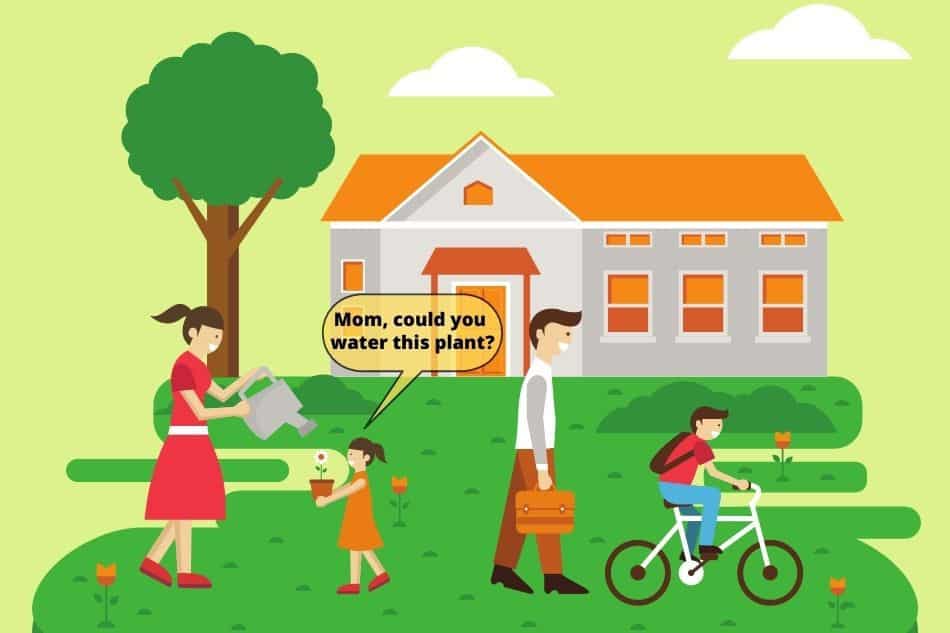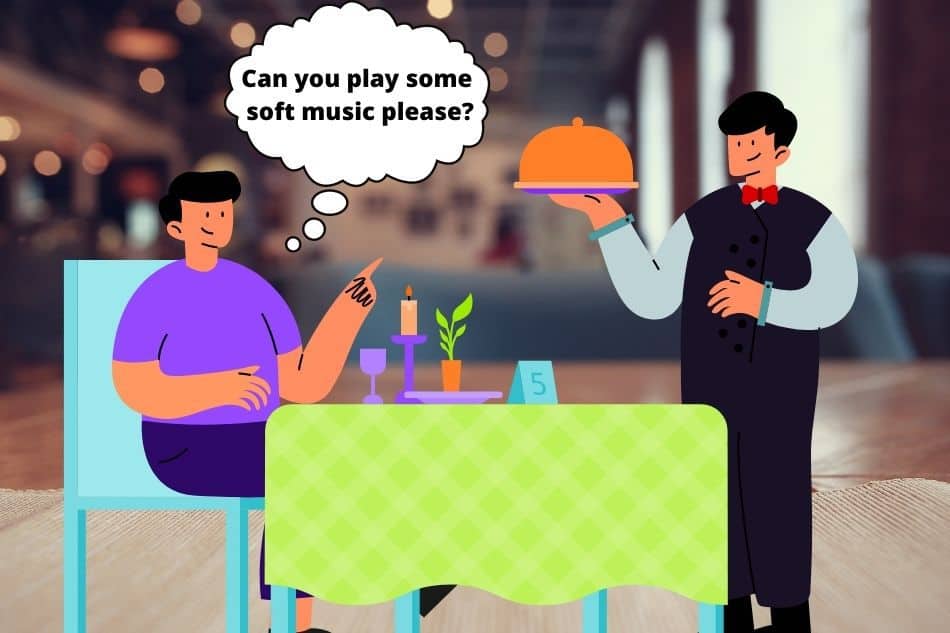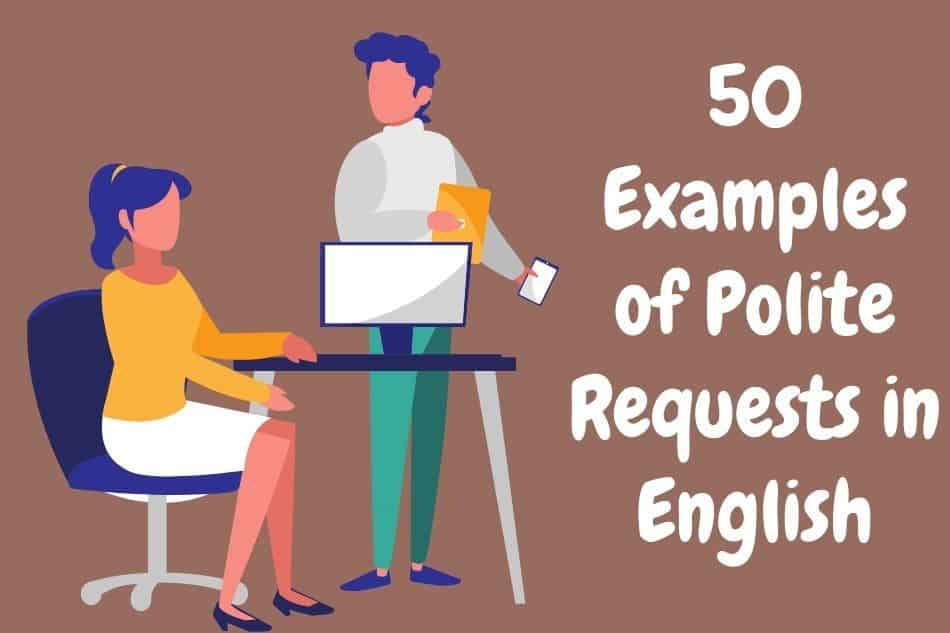This article covers the following areas –
- Polite Requests at Home
- Polite Requests at School
- Polite Requests at Work
- Polite Requests at the Restaurant
- Polite Requests at the Public Place
- Final Words
- Let’s Practice Now – Quiz
- Frequently Asked Questions

We interact with many people every day, and we usually make polite requests to them. Making a polite request means asking someone to do something politely. For example, “Can you please tell me the time?” or “Can you give me a hand?”
Below is a table with English expressions for making requests in different contexts, such as at home, school, work, a restaurant, and a public place.
| Context | Expression 1 | Expression 2 | Expression 3 |
|---|---|---|---|
| Home | Could you please pass the salt? | Would you mind turning down the TV a bit? | Is it possible for you to help me with the dishes? |
| School | May I borrow a pencil, please? | Can I have some assistance with this problem? | Would it be okay if I left early for an appointment? |
| Work | Would you be able to email me the report? | Could we set up a meeting to discuss this? | I was wondering if I might take a day off next week? |
| Restaurant | Could I get the menu, please? | May I request a table by the window? | Would it be possible to have the dressing on the side? |
| Public Place | Excuse me, could you direct me to the subway? | Is it alright if I take this seat? | Would you mind keeping an eye on my bag for a moment? |
These expressions are designed to be polite and considerate. They use modal verbs like “could,” “would,” and “may,” which are typical for polite requests in English. They also sometimes include phrases like “Would you mind” and “Is it possible,” which soften the request and make it more courteous.
However, in the later part of the post, I’ve listed 50 more common examples of polite requests based on different situations, like when you’re at home, school, work, a restaurant, or a public place. I’ve listed 10 examples for each of these situations.
Polite Requests at Home

At home, we interact with family members, such as parents, children, siblings, roommates, or even babysitters and servants. Although “At home” is an informal environment, we probably want to be polite to them when we ask them to do something for us.
To make polite requests at home, use courteous language and phrases such as “Could you please…” or “Would you mind…”. This approach reflects respect and consideration for the other person, fostering a harmonious and cooperative home environment.
Even in the informal setting of home, maintaining a level of formality in our requests can be beneficial. Using formal language like “Would it be possible for you to…” or “I would appreciate it if you could…” shows respect and appreciation for the efforts of family members or housemates. This practice encourages mutual respect and creates a more pleasant and supportive atmosphere at home.
The following examples of polite requests in daily conversations are commonly used at home.
- Mom, can you close the door, please?
- Honey, can you please eat with your mouth closed?
- Can you shut the window? The room is already too cold.
- Anna, can you bring me the newspaper, please?
- Bob, will you stop bothering Mom? She’s working.
- Hey, can you please receive the parcel? I’m going to take a shower.
- Could you get me a cup of coffee?
- Will you stop making noise? I can’t concentrate on my study.
- Could you feed something to the baby?
- Could you turn off the lights, please? I can’t sleep.
Sample Conversation
Situation: Linda has been busy all day and notices some chores are still left to do. She asks her husband, Mark, for help, making polite requests to ensure everything is handled.
Linda: Hey Mark, could you please take out the trash? It’s overflowing.
Mark: Sure thing, I’ll do that right away. Anything else?
Linda: Could you also walk the dog? He hasn’t been out since this morning.
Mark: No problem, I’ll take him for a walk. Do you need help with anything else?
Linda: Could you pick up some groceries on your way back? We’re out of milk and eggs.
Mark: Absolutely, I’ll stop by the store. How about we order in for dinner tonight?
Linda: That sounds perfect. Thanks, Mark.
Mark: Anytime, Linda. Enjoy a break while I handle this.
Linda: You’re the best. Thanks again!
Polite Requests at School

Be polite to your teachers, students, classmates, or others at school. You should be courteous enough while talking to a teacher because this is a formal relationship. On the other hand, while talking to your friends, you don’t have to be as formal as with a teacher, but make sure to be nice.
In a school setting, polite requests involve using respectful language, such as “May I please…” or “I would appreciate it if…” This approach conveys respect for authority and peers, contributing to a positive and collaborative educational environment.
Maintaining formality when interacting with teachers is essential, as it demonstrates respect for their role and fosters a positive student-teacher relationship. Phrases like “Could you kindly…” or “Would it be possible to…” are suitable for such interactions.
When speaking with friends, a balance of politeness and informality is ideal, using phrases like “Can you help me with…” while ensuring kindness and respect are always present.
Look at the following examples of polite requests commonly used at school.
- Teacher, would you mind giving me detailed feedback on my homework?
- Can you pass me that book?
- Could you please help me with my homework?
- I was wondering if you could write a recommendation letter for me.
- I was wondering if it would be possible for you to send me the feedback tomorrow.
- Could you please keep quiet?
- Can you please change your seat?
- Could you show me the way to the library?
- Can you please hold this book for me?
- Will you pass me the ball?
Sample Conversation
Situation: Ms. Carter notices that there are still some tasks to be completed in her classroom and decides to ask her student, James, for some help. She makes polite requests to ensure everything is taken care of.
Ms. Carter: Hey James, could you please help me arrange the chairs?
James: Sure, Ms. Carter. I’ll get started right away. Anything else?
Ms. Carter: Could you also wipe the board? It still has notes from the last class.
James: No problem, I’ll take care of that. Do you need help with anything else?
Ms. Carter: Could you collect everyone’s assignment sheets? They’re due today.
James: Absolutely, I’ll go around and collect them. Is there anything else you need?
Ms. Carter: That’s all for now. Thank you, James.
James: Anytime, Ms. Carter. I’m happy to help.
Ms. Carter: You’re a big help. Thanks again!
Polite Requests at Work

We usually interact with our coworkers, managers, and other staff daily at the office. As this is a formal environment, we’re supposed to be extremely polite if we need to ask someone to do something for us. We must use appropriate phrases, expressions, and body language to get things done.
At the office, polite requests involve using professional language and courteous phrases like “Could you kindly…” or “I would be grateful if…” This reflects respect for colleagues and superiors, fostering a cooperative and respectful workplace culture.
Maintaining formality in our requests is crucial for ensuring clarity and professionalism. Expressions such as “Would you mind…” or “May I ask you to…” show thoughtfulness and consideration. This approach helps create a positive atmosphere where everyone feels valued and respected.
Additionally, appropriate body language enhances the effectiveness of polite requests. Maintaining eye contact, smiling, and using a friendly tone can reinforce the politeness of your words. This nonverbal communication helps build trust and encourages a supportive work environment.
Being polite and respectful when making requests not only aids in smooth communication but also strengthens professional relationships. It promotes a harmonious office environment where collaboration and mutual respect are prioritized, increasing productivity and job satisfaction.
The following examples can help make polite requests in English at work.
- Could you give me some time after lunch?
- I was wondering if you could reschedule the meeting for next week.
- Could you please send me the project files in zip format?
- Do you mind passing me the stapler?
- I was wondering if it would be possible for you to write a short description of the project for our website.
- Would you please take your seat?
- Would you please hand me the mic?
- John, would you mind helping Sarah in preparing the draft budget? Thanks in advance!
- Could you possibly meet me next week at the office?
- Could you telephone me in the afternoon?
Sample Conversation
Situation: Karen needs help finishing a project and asks her colleague, David, for assistance.
Karen: Hey David, could you please review this report for me?
David: Sure, Karen. I’ll look at it right away. Anything else?
Karen: Could you also update the client list? It needs some recent changes.
David: No problem, I’ll handle that. Do you need help with anything else?
Karen: Could you prepare the presentation for tomorrow’s meeting?
David: Absolutely, I’ll get it done. Is there anything else?
Karen: That’s all for now. Thanks, David.
David: Anytime, Karen. I’m glad to help.
Karen: You’re a lifesaver. Thanks again!
Polite Requests at the Restaurant

We interact with restaurant waiters, managers, friends and family, and strangers. Whether it’s a semiformal or formal situation, consider being polite enough when you request someone.
In a restaurant, polite requests involve using courteous language, such as “Could I please have…”, “May I request…” or “I would like to order…” This conveys respect and appreciation for the staff’s service, enhancing the dining experience.
Using polite language makes your requests clearer and creates a pleasant atmosphere. Phrases like “Could you please bring me…” or “May I ask for…” show that you value the efforts of the restaurant staff. This respectful approach often leads to better service and a more enjoyable meal.
Additionally, politeness extends to interactions with other diners. When requesting something from friends or family, phrases like “Would you mind passing the salt?” or “Could you please…” maintain a friendly and considerate tone. This helps in keeping the dining experience pleasant and cooperative.
Being courteous in a restaurant also involves non-verbal cues such as smiling, making eye contact, and using a friendly tone. These gestures and polite language ensure that your requests are well-received and contribute to a positive dining environment.
Remember, polite requests at a restaurant are not just about getting what you want but also about creating a respectful and enjoyable experience for everyone. This approach enhances the overall atmosphere and leaves a positive impression on the staff and your dining companions.
Look at the examples below that can usually be relatable at restaurants.
- Can you add some extra cheese?
- Could you please make it a double?
- Excuse me! Would you mind leaving this seat for this old lady?
- Do you mind passing me the salt?
- Can you play some soft music?
- Could you please arrange one more table for us?
- I was wondering if you could cancel my order. My guests aren’t coming.
- Could you please change this food? I can see a fly on the rice.
- Would you please turn on some more lights?
- Can you give us some forks?
Sample Conversation
Situation: Emily is at a restaurant and needs some assistance from her server, Alex.
Emily: Excuse me, Alex, could you please bring us some extra napkins?
Alex: Of course, Emily. I’ll bring them right away. Anything else?
Emily: Could you also refill our water glasses?
Alex: No problem, I’ll take care of that. Do you need anything else?
Emily: Could you check if our order is ready? We’ve been waiting for a while.
Alex: Absolutely, I’ll go check on it right now. Is there anything else I can do for you?
Emily: That’s all for now. Thank you, Alex.
Alex: Anytime, Emily. I’m here to help.
Emily: You’re very attentive. Thanks again!
Polite Requests at the Public Place

We often interact with strangers when we’re at a public place like a station, a supermarket, a restaurant, a walkway, or a train. No matter where you meet strangers, be polite enough if you have to make a request.
In public places, politeness is key. Use phrases like “Excuse me, could you please…”, “I wonder if you might…”, or “Would it be possible to…?”. These expressions show respect and consideration for others, facilitating a positive and cooperative interaction in shared spaces.
Using polite language in public places helps make your requests clear and respectful. For instance, “Excuse me, could you please tell me the time?” or “I wonder if you might help me with these bags?” shows that you consider the other person’s time and space. This approach makes interactions smoother and more pleasant.
Being polite in public also means using appropriate body language. Smiling, maintaining eye contact, and using a friendly tone can enhance the effectiveness of your request. These nonverbal cues complement your words and help create a positive impression.
Remember, politeness in public places helps get what you need and contributes to a more respectful and friendly community. Whether asking for directions, requesting help, or seeking information, using courteous language and gestures fosters goodwill and cooperation among strangers.
The following can be good examples of making polite requests in a public place.
- Would you mind moving aside?
- Could you please press level 5?
- Could you tell me how to get to the supermarket?
- Do you mind giving me a hand with my luggage?
- Would you mind holding the baby for me?
- I wonder if you could help me hire a taxi. I’m pretty new here.
- Could you please keep an eye on my dog? I’ll be right back.
- Could you change the destination on my ticket? I’d like to go to NoHo instead of Bowery.
- Could you please open the door for that old lady?
- I wonder if you could drive a little faster.
A Sample Conversation
Situation: Jessica is at a library and needs some assistance from the librarian, Mr. Brown.
Jessica: Excuse me, Mr. Brown, could you please help me find this book?
Mr. Brown: Of course, Jessica. I’ll look it up for you. Anything else?
Jessica: Could you also recommend some books on history?
Mr. Brown: No problem, I’ll find some good ones for you. Do you need help with anything else?
Jessica: Could you show me where the study rooms are?
Mr. Brown: Absolutely, I’ll guide you there. Is there anything else?
Jessica: That’s all for now. Thank you, Mr. Brown.
Mr. Brown: Anytime, Jessica. Happy to assist.
Jessica: You’ve been very helpful. Thanks again!
Final Words
Politeness is key when making requests. It shows respect for others’ time and effort. You avoid sounding rude and create a positive impression by using polite words and phrases.
Always ask for permission politely and check if the person is free to talk. Proper body language, like smiling and eye contact, can enhance politeness. These small gestures can make a big difference in how your requests are received.
Improving your interactions through politeness helps build positive relationships. It fosters goodwill and makes everyday exchanges smoother and more pleasant for everyone involved. Politeness is a simple yet powerful tool in effective communication.
Let’s Practice Now – Quiz
Frequently Asked Questions
Make a polite request in English by using phrases like “Could you please,” “Would you mind,” or “May I.” These expressions show respect and consideration.
A formal way to ask for permission is by saying, “May I,” or “Would it be possible to.” These phrases are appropriate for professional settings and show politeness.
Ask someone to do something politely by saying, “Could you please,” or “Would you mind.” These expressions make the request sound courteous and respectful.
When asking for help, say, “Could you help me with,” or “Would you be able to assist with.” These phrases are polite ways to seek assistance.
Ask for information politely by saying, “Could you tell me,” or “May I ask.” These expressions are respectful and show that the request is made politely.
A courteous way to make a suggestion is by saying, “Would it be possible to,” or “Have you considered.” These phrases make suggestions sound polite and thoughtful.
Ask for a favor politely by saying, “Could you do me a favor,” or “Would it be possible to help me with.” These expressions show appreciation and respect.
A polite way to decline a request is by saying, “I’m afraid I can’t,” or “Unfortunately, I’m not able to.” These phrases are gentle and show understanding.
Ask for clarification politely by saying, “Could you explain,” or “Would you mind clarifying.” These expressions show that the request is made respectfully.
Ask someone to wait politely by saying, “Could you hold on for a moment,” or “Would you mind waiting.” These phrases are courteous and considerate.







